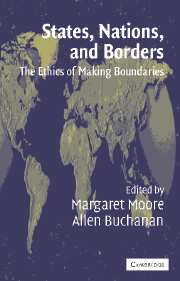Book contents
- Frontmatter
- Contents
- About the Contributors
- Acknowledgments
- 1 Introduction: The Making and Unmaking of Boundaries
- THE JEWISH TRADITION
- THE CONFUCIAN TRADITION
- THE CHRISTIAN TRADITION
- THE NATURAL LAW TRADITION
- THE ISLAMIC TRADITION
- THE LIBERAL TRADITION
- THE INTERNATIONAL LAW TRADITION
- 14 International Law and the Making and Unmaking of Boundaries
- 15 People and Boundaries: An ‘Internationalized Public Law’ Approach
- CONCLUSION
- Index
15 - People and Boundaries: An ‘Internationalized Public Law’ Approach
Published online by Cambridge University Press: 24 November 2009
- Frontmatter
- Contents
- About the Contributors
- Acknowledgments
- 1 Introduction: The Making and Unmaking of Boundaries
- THE JEWISH TRADITION
- THE CONFUCIAN TRADITION
- THE CHRISTIAN TRADITION
- THE NATURAL LAW TRADITION
- THE ISLAMIC TRADITION
- THE LIBERAL TRADITION
- THE INTERNATIONAL LAW TRADITION
- 14 International Law and the Making and Unmaking of Boundaries
- 15 People and Boundaries: An ‘Internationalized Public Law’ Approach
- CONCLUSION
- Index
Summary
The editors of this volume regard international law as an ethical tradition to be appraised alongside Confucianism or liberalism. Certainly it is a tradition of thought – its adherents are conscious of carrying on a shared enterprise, recognize canonical texts and modes of argument, identify a common (if changing) set of problems, and have a defined professional identity of mutual recognition and mutual defense. But is it an ethical tradition? Three features of the international law tradition muddy comparison with archetypal ethical traditions.
First, international law is almost bound to aspire to universality: its normative propositions thus appeal to universalist ethical justifications, but seemingly-universal justifications often prove to be particularist when probed in hard cases. Ethical justifications in international law thus move between universals stated very abstractly – the ethic of peace and effectiveness has been preponderant among international lawyers since 1945 – and a plethora of unreconciled and often contested specific ethical structures. These can endure unreconciled because international law holds itself out not only as an ethical tradition, but as a means of bridging traditions and establishing widely-accepted criteria under which those from different ethical traditions can agree together on practical action. The discipline is thus in internal tension between this pull toward ecumenical neutrality and competing pulls of specific ethical traditions, above all the pull of the liberal ethical systems in which many of the dominant voices in international law are socialized.
Second, international law is to some extent validated by practice, and continuous movement between theory and practice is essential to the argumentative pattern of international law.
- Type
- Chapter
- Information
- States, Nations and BordersThe Ethics of Making Boundaries, pp. 298 - 316Publisher: Cambridge University PressPrint publication year: 2003



